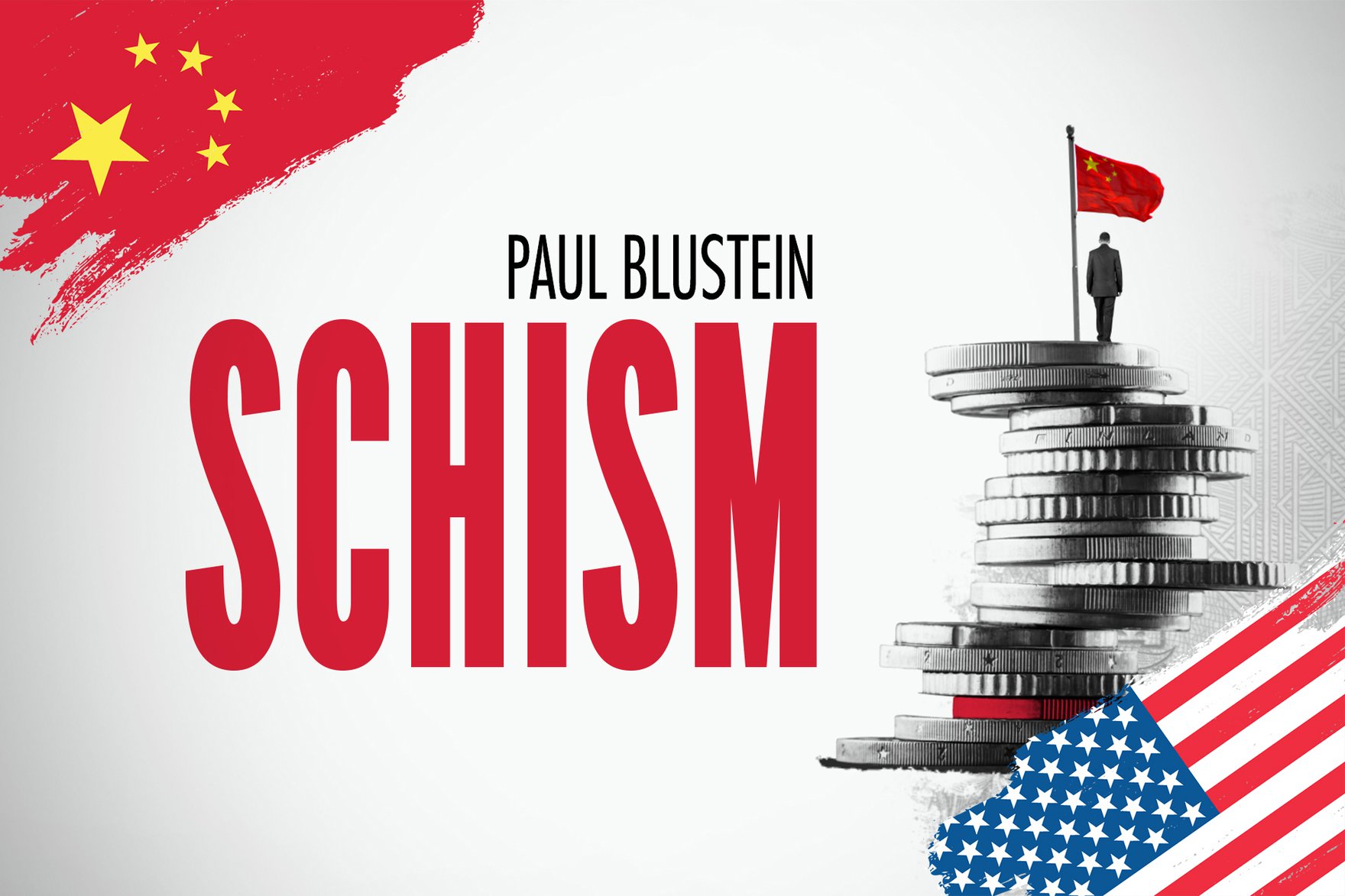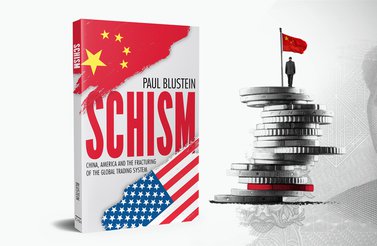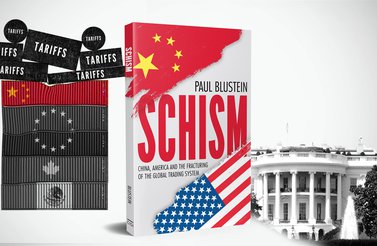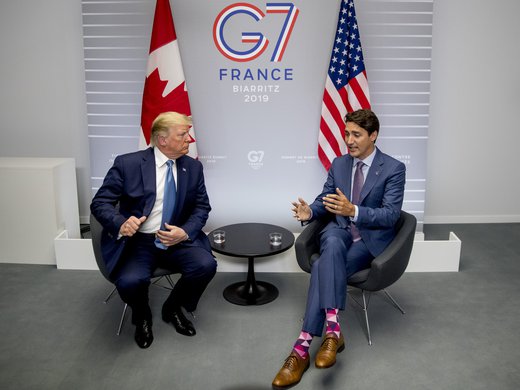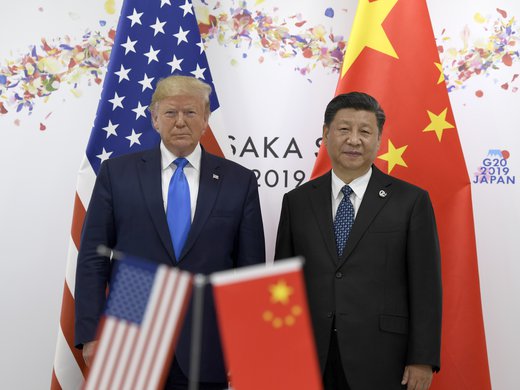When Paul Blustein first started writing Schism: China, America, and the Fracturing of the Global Trading System, US President Barack Obama was still in the White House, and the relationship between the world’s two economic superpowers looked markedly different than it does today.
With Schism, which will be released on September 10, Blustein wanted to dispel some of the misconceptions he thinks have arisen about China and the rules-based international economic order, in particular, the ideas that the country acceded to the World Trade Organization (WTO) on exceptionally lenient terms and that now, as a member, it massively flouts the rules.
“I assumed I’d be writing a book that might be of use to people in the Hillary Clinton administration,” he admitted in a recent interview. Regardless of the outcome of the 2016 presidential election, he correctly surmised that the need to understand China’s role in the global economy would be very much present in 2019. “Even if [Clinton] had won, I think there would have been some pretty severe conflict between the US and China,” he said, although “one would think it would’ve been handled from Washington a heck of a lot more skilfully and adroitly than it has been.”
Blustein is referring, of course, to the chaos inflicted on the global trading system by a US-China trade war that, he says, is largely a result of “really terrible, wrong-headed steps” by the administration of President Donald Trump.
A year into the conflict, no one is quite sure when or how it will end. But with his chronicling of China’s joining of the WTO and the subsequent transformation of its relationship with its trading allies, Blustein hopes to help readers make sense of how things got to this point.
What should readers know about China’s WTO accession in order to understand the current trade conflict?
One of the main points is that China, because it really wanted to join the WTO, was basically forced to accept conditions that went far beyond what normal WTO rules require and what any other country has been required to accept to get in. The Chinese wanted the protection that came with WTO membership — the protection being, you can’t just arbitrarily be slapped with tariffs (at least that’s supposed to be the case, although Donald Trump ignores that). During the period before China joined, when the United States and other countries didn’t like what China was doing — for example, violating intellectual property rights — those countries just said to China, “We’re going to slap tariffs on you.” Also, the US Congress conducted annual reviews of China’s human rights policies, the threat being that failure to improve treatment of dissidents would result in high tariffs on Chinese goods, which made things very uncertain for Chinese exporters.
So, China really wanted in [to the WTO], but the US had them in a corner, being able to say, if you want in, you’re going to have to agree to these very onerous terms, including not only opening the Chinese market but agreeing that our market will be protected from Chinese products — these were concessions that most other countries never have to make.
The Chinese, with their century of humiliation — starting with the Opium Wars and going on through the Japanese invasion and colonization, all the way through to the Chinese Communist Revolution of 1949 — understandably took umbrage at this. And they just swallowed hard and accepted that they would have to do this. On some level I think the leadership understood why other countries were a bit scared about Chinese competition.
The big assumption at that point was that China was going to evolve into something that was sort of like what [the province of] Taiwan is today, a much freer, open-market type of economy. It wouldn’t necessarily be a paradise for human rights by any means, but they were a capitalist economy — and because they had moved so far in shedding the vestiges of communism, the assumption was that they would continue on that path. I think the Chinese — certainly Premier Zhu Rongji, who was the main guy leading China down that road — honestly believed that that’s where they were going.
The WTO terms were onerous, but the Chinese believed that the benefits outweighed the cost, and they were willing to accept this blow to their pride. Even so, when you talk to some of the Chinese people involved in those negotiations, they remember how furious it made them to take what they considered to be second-class citizenship.
How do those lingering feelings play into China’s response to Trump’s posturing today?
The accusation Trump and his US Trade Representative’s office make is that China got in on excessively easy terms — that way they can blame it all on a mistake by the Clintons. Bill Clinton wasn’t president at the time that China got into the WTO, but he was president in 1999 when the main deal was struck.
This argument that China was treated with kid gloves…I just think that’s a terrible misconception, to approach China from that perspective, that letting them in the WTO was just a dumb deal in the way Trump talks about every deal — “The TPP was a disaster, NAFTA was a disaster, the WTO was a disaster.” [It’s not] that China has evolved since then in ways that are consistent with [Western nations’] expectations, but I think understanding the history is crucial to seeing why there really is a legitimate concern about China, while trying to find a better, more sensible approach than what we now have.
What would you say to those who argue China is cheating the system?
I agree there’s a serious problem with the way China’s economic policies and trade practices work, so I don’t want to minimize that. But, at the same time, I don’t think calling that “cheating” is either accurate or helpful terminology, so I wanted to write about how the real issue is the way the Chinese economy has evolved since it got into the WTO. The Chinese have very ingeniously developed a system that makes it possible for the party-state to help achieve industrial policy goals and to make the economy operate in ways that disadvantage foreign competitors.
I think China takes very seriously the idea that, having promised to obey certain rules, they should obey those rules to the letter. You can see this particularly in the way they act when they lose a case before a WTO tribunal. When someone brings them to the WTO and accuses them of violating the rules, and the tribunal agrees that a violation occurred, the Chinese are very good about bringing their laws and regulations into compliance with that, even if they think that the decision was really wrong.
However — and you hear people say, well, here’s why Trump is right — you could say that the Chinese do not have nearly so much respect for the spirit of the WTO, the spirit being that you’re supposed to be constantly moving in the direction of opening your markets, becoming more of a market economy. China moved in the opposite direction, particularly since Xi Jinping became general secretary of the Communist Party in 2012. All the control that the party-state exerts over the internal operations of the economy and how specific companies act, in particular state-owned enterprises, makes countries feel that they’re up against a competitor that operates in ways that violate the basic underpinnings of the system.
So I do think that’s an understandable grievance. But I don’t think it’s quite right to call that cheating, and I don’t think that that’s a particularly helpful way of looking at it. When you call it cheating, the conclusion one draws is China doesn’t care about the rules, so we should just ignore the rules too, rules are useless, unilateral action is the only thing that works. And I don’t think that’s true. It’s better to have a good, nuanced understanding of the ways in which China is problematic, because only then can you begin to conceive of sensible ways of dealing with it.
Going forward, what should the WTO do to address some of China’s behaviour?
The WTO rules are definitely insufficient. That said, there’s a small point and a big point to be made. The small point is that there’s a provision in China’s accession agreement — I talk about this in my chapter where I set forth some policy prescriptions — which is a quite striking concession that the Chinese made to get into the WTO. China accepted that if a country is concerned about a lot of subsidized Chinese goods coming into its market, that country can take action to raise tariffs much more easily than in cases involving other countries’ subsidized goods. This sort of tariff — countervailing duties, they’re called, which are used to protect against subsidized imports — are often quite difficult to impose under WTO rules, but China agreed to allow its trading partners to use this protection against its goods on relatively loose terms. Surprisingly, countries haven’t used this protection that China agreed to; they haven’t taken advantage of an important concession China made.
The larger point is that the WTO has this kind of catch-all rule, which I also write about in the book. It’s one of the original articles of the General Agreement on Tariffs and Trade, which preceded the WTO: the nullification or impairment condition. It basically says that if you think one of your trading partners is acting in ways that nullify or impair your rights under the agreement, you can sue them at the WTO, even if they may not be violating a specific rule. This is absolutely perfect for dealing with China. I should add that this is not an original argument made by me; it was originally raised by Jennifer Hillman, a former judge on the WTO Appellate Body, the supreme court of the WTO.
Now, do I think that this case would be a slam-dunk win for countries that bring it? No. First of all, it would take years — WTO cases drag on forever — and second, the plaintiffs might not prevail. The best outcome I can envision, the preferable outcome, is that there would be a negotiated settlement, in which the Chinese would agree to the kinds of reforms that they seemed to be willing to do earlier this year, and much less reluctant about implementing those reforms. Right now, they’re negotiating with this gun to their head and they keep saying, “We’re not going to do that, we refuse to give in to threats.” But they do recognize that economic reform could very much be in their self-interest, as it was when they joined the WTO in the first place.
Xi Jinping believes one thing above all: that the Communist Party must have absolutely dominant control over the governance of that country. He’s not going to say, okay, we’re going to become like Canada. So I don’t want to oversell this…but I do think that this big aspect of the WTO system, the nullification and impairment provision, should make it possible for a pretty good solution. The system isn’t perfect, but it’s pretty free and pretty fair. If there’s some effective way of getting the Chinese to at least dismantle some of their more objectionable practices, lower some of the tariffs that they have that they don’t need anymore, that would be a good thing.
How optimistic are you that this outcome will sort out the current trade war?
I’m not optimistic that that’s what’s going to happen. I think the Chinese have figured out by now that Donald Trump is obsessively concerned about the stock market. If he pushes China too far, either by raising tariffs even more, or particularly if he pushes them by basically strangling Huawei, they will decide that they have to respond in a way that very clearly shows the financial markets that they are ready to “eat bitterness.” They will decide to start doing things to American companies that they have been reluctant to do, because they don’t like to make the Chinese market appear inhospitable to companies that they really want there. But if it’s that or surrender, they will decide that they’re going to crash the markets.
Once the markets start to crash, my strong sense is that Trump will want to hoist the white flag. The problem is that Trump has painted himself into a corner by using such belligerent language. He knows he’d be portrayed as this guy who caves in, which of course he hates — he’s even more vainglorious than the Chinese are about their century of humiliation. But I feel confident that he’ll be desperate for a deal rather than allow the economy to collapse, so he’ll surrender — and by surrender, I mean he’ll strike a deal that’s pretty meaningless, which the Chinese will be happy to sign.
That’s a perfectly plausible outcome, but I don’t think that that’s any good either! After all, China is a problem for the trading system. And if that’s the way things go, it just leaves the problem to fester for the next administration…it would be much better if we ended up with a deal where the Chinese concessions were both significant and sincere. I think it’s highly unlikely they’re going to get either of those things, and it’s also entirely possible that we get a kind of economic divorce where the US is saying, all right, we’re going to kill Huawei, and the Chinese say, if you’re going to kill Huawei, we’re going to inflict significant damage on Apple and Qualcomm.
I don’t think that kind of scenario is at all inconceivable; I’d like to think it’s not likely, but it’s quite conceivable. Both of those scenarios are pretty lousy — it’s just a question of how truly terrible they are. The rules are such that I think there could’ve been a much better outcome…but that’s not Trump’s style at all.
